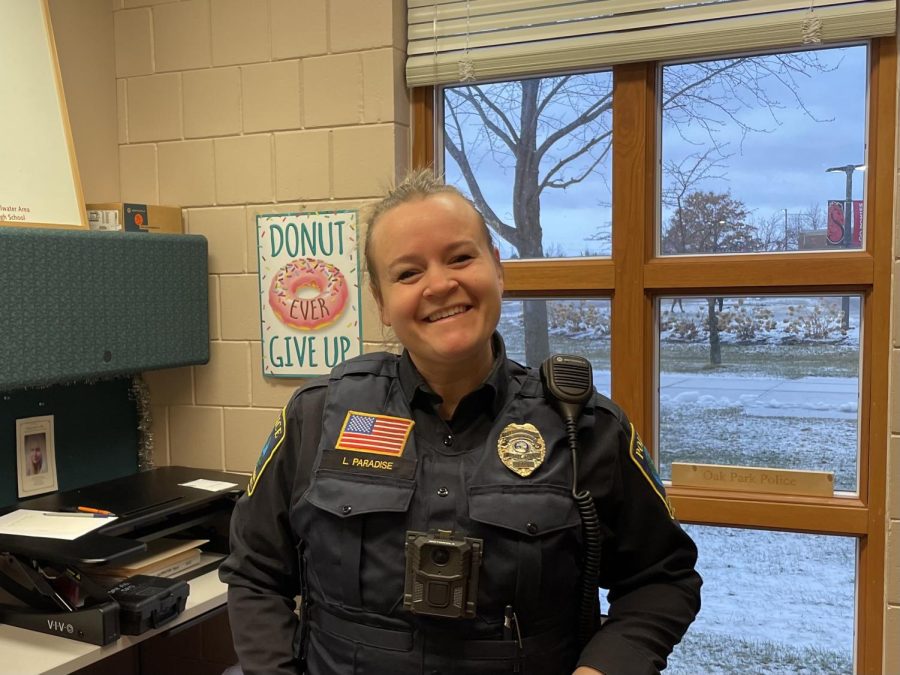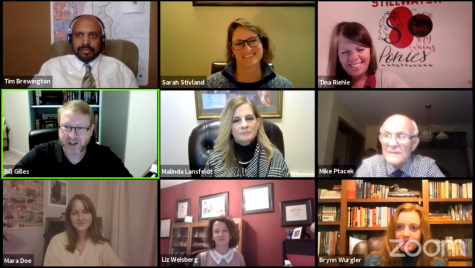Administration must increase transparency with safety
April 15, 2022
Officer Paradise is the primary law enforcement officer at Stillwater Area High School. Paradise oversees safety and security for the school.
So far this year, Stillwater Area High School has gone into two lockdowns occurring Dec. 14, 2021 and Feb. 22 in response to emergency events. During both lockdowns, the school has provided vague communication with students, teachers and parents, which has led many students and parents to be upset with how the district handles emergency situations. They call for more transparency from the district and improved communication. Each lockdown has posed a different threat to students, calling for a different type of lockdown.
The school uses two types of lockdown procedures: modified and emergency. Modified lockdowns are used when there is a threat in the community. In this lockdown teachers lock their classroom doors and resume teaching as usual. If the threat moves onto school property, an emergency lockdown is initiated. Teachers keep their doors locked, shut off the lights and move students to a side of the room that is not near the door or any windows where the threat could see students.
Throughout the past two lockdowns, teachers and parents received brief emails from the school explaining there was a threat in the school/community and that the school was in lockdown with no further information shared. After criticism from parents and students, the district plans to improve on providing more details as more information is learned.
“I don’t necessarily think the school should be sending out information right away in case false information gets out or something, but after there is confirmed information of what happened, having even a script for teachers to read to the class would be helpful to explain to students what happened. So then people have a clearer picture of what’s going on and it stops any rumors or misinformation,” junior Lauren Guinee said.
“After the first lockdown, administration was really quick to blame social media for spreading rumors but I think the issue is that when the school doesn’t communicate information to us, we just want any information we can get so then we go on social media. Even if it’s not true information, it’s better than nothing,” junior Brooke Elfert said. After the first lockdown, administration was really quick to blame social media for spreading rumors but I think the issue is that when the school doesn’t communicate information to us. — Brooke Elfert
It is important to provide emotional support to students in the aftermath of an emergency situation. After the Feb. 22 lockdown, students had only a few minutes to recover before passing time started. Having an opportunity to process emergency situations will be beneficial to students’ mental health and well-being.
After the second lockdown, the school went “back to business” after only a few minutes which led to some students getting “really scared, I know a bunch of people who have severe anxiety, and they have had difficulty processing events like this. If students were given even 5-10 minutes to process and had an opportunity to talk with other classmates then that would’ve made it a lot better,” junior Sydney Rodd said.
In response to students’ concerns about communication, the district has released an emergency texting service to middle and high school students called ‘Pony Deets’. ‘Pony Deets’ will ensure students receive the most up-to-date information when school is delayed, closed or there is an emergency in their building.
“[‘Pony Deets’] actually something we’re doing directly in response to what we’ve heard after these most recent lockdowns is that people want us to do a better job of communicating, you would be getting as a student the same message that would go out to families in an emergency,” Community Engagement Manager Carrisa Kiester said.
Students can register themselves to receive messages from ‘Pony Deets’ through PowerSchool underneath the form named “Authorization to Text Student”. Once students register they will be opted in the receive messages until they opt-out or graduate.
Once the student submits the form, they will get a text message sent to confirm they have registered because of FCC regulations. Once the student receives that text, that means that they are in the service and the district will not send messages unless there is an emergency, it is just saved for those emergency situations, Kiester explained.
Although ‘Pony Deets’ will increase communication to students, the district must also provide more context with the information it shares out in order for Pony Deets to be an effective medium of communication. Increasing transparency with students, teachers, and parents will make everyone feel safer in emergency situations and will limit rumors from spreading.


Gabrielle Knowlan • May 19, 2022 at 8:00 am
The opinions throughout this story were really strong, I think that having student input really made this story strong. The framework was great, and the story had a really compelling message.